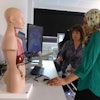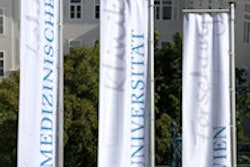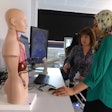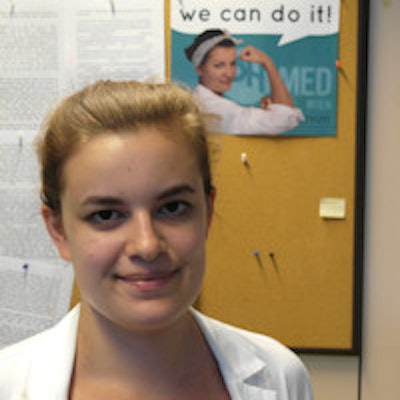
VIENNA - Frédéric Paul René Tömböl is wrapping up his studies at the Medical University of Vienna, preparing for six years of clinical training, and then a possible career at Austria's premier hospital. His plans may not sound all that unconventional, but what is unusual is that he intends to stay in Austria. According to a recent survey, some 53% of Austrian students at three public medical universities said they would prefer to go to other countries for careers in radiology and other fields, with 70% citing better pay as a reason.
Times have changed very quickly, said Tömböl, who is chairman of the Vienna medical students' union, the OeH Med. As recently as a few years ago, there were too many young doctors chasing too few jobs at public medical centers.
 Something has to be done right now, according to Frédéric Paul René Tömböl. Image courtesy of OeH Med Wien.
Something has to be done right now, according to Frédéric Paul René Tömböl. Image courtesy of OeH Med Wien."You used to have to wait, sometimes two years, in order to work as a physician in Vienna. Now, you don't have to wait a single month," he told AuntMinnieEurope.com. "It's alarming for the Austrian health care system and it should be -- something has to be done right now."
Dr. Sarah Schober, the overall head of the union that represents the university's more than 7,000 medical, dental, and doctoral students, said pay is not the main issue.
"The hierarchy is such a huge problem here," she said, noting that a brick wall often exists between medical students and their professors. "It's sometimes so strange here. We have really good relationships with a lot of professors, and we talk to each other regularly. But then on any ward, if you want to do the same, they would just treat you not respectfully."
Long-simmering complaints about pay and working conditions at the university's clinical hospital -- the Allgemeines Krankenhaus (AKH) -- and other public medical facilities erupted this year over the handling of a new law that imposes a maximum 48-hour workweek for health workers.
In March, hundreds of physicians took to the streets to demand extra staff and higher salaries to compensate for the loss of overtime due to the working restrictions. In May, a strike at the AKH was narrowly averted when the university and city government agreed to give doctors a one-time 8,000 euro payment and a 30% pay rise over three years.
Vicious circle
Switzerland and Germany are the preferred destinations for Austria's medical migration. Training opportunities are a driving force, and on the AKH campus, students complain that there are not enough doctors to juggle both academic and clinical duties. AKH is Europe's biggest university hospital, and has more than 1,500 doctors in 27 clinics, including radiology and nuclear medicine.
"It's a bit of a vicious circle because they [professors] do not have the time to teach young doctors the way they should teach them," Tömböl said. "And to be honest, you can feel that in Austrian hospitals -- they don't have a lot of time for you as a young doctor."
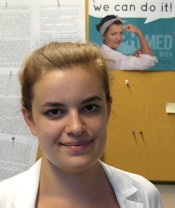 The hierarchy is such a huge problem here, said Dr. Sarah Schober.
The hierarchy is such a huge problem here, said Dr. Sarah Schober.Schober describes a more relaxed and hands-on atmosphere at the University of Tampere in Finland, where she did a surgical practicum.
"I was totally astonished," she said. "I was in the theater the first day and I was so overwhelmed by the amount of questions the student asked, and I was not used to it at all. ...You get so much practical medical training even if you are a second- or third-year student."
The union's survey involved 1,149 students at medical schools in Vienna, Graz, and Innsbruck. Published on 4 March, it showed that 70.8% of respondents cited pay as a reason to go abroad, followed by training opportunities (66.2%), working conditions (63.3%), working hours (52%), and "work/life balance" (40.4%).
The poll was taken before the pay agreement at the AKH. The results appear in line with other evidence of a migration of young doctors out of the country. Officials at the Vienna medical chamber, the Aerztekammer für Wien, estimate that up to 40% of medical school graduates now leave Austria, lured partly by higher pay. The new pay deal at the hospital may help retain graduates, however.
"With this new agreement we have competitive salaries -- especially for the young doctors -- and in 2019 it will be even more than other universities in Austria or Germany," Dr. Martin Andreas, a surgeon who heads the 20-member physicians council that helped negotiate the new pay accord, told AuntMinnieEurope.com.
Brain drain or brain gain?
Europe's pay gap
A study by the European Federation of Salaried Doctors showed the monthly minimum pay for Austria's hospital doctors, 2,090 euros, was well below the comparable pay in 12 other European Union countries, including the top five nations:
Denmark: 8,333 eurosThe Netherlands: 6,300 euros
Belgium: 6,250 euros
France: 4,569 euros
Italy: 4,500 euros
Germany: 3,842 euros
The survey showed a similar gap at the top of the pay scale.
Source: European Federation of Salaried Doctors, 2011.
Austria is far from alone when it comes to concerns about losing doctors to countries offering more inviting pay and benefits. Poland's Chamber of Physicians and Dentists, the Naczelna Izba Lekarska, warned in May of a surge in the number of radiologists and other specialized physicians leaving for other EU countries. Hungarian physicians have noted similar challenges.
However, Schober sees more brain gain than drain in the movements of doctors within the EU, saying medicine gains because physicians are exposed to new ideas and a broader horizon. She and her partner -- also a Vienna medical student -- plan further training outside of Austria and aren't ruling out moving with their two children to Finland to pursue medical careers.
"But I really want to come back when I am ready for it, when I am established, and when I am in a teaching role," she said. "I would really like to come back and bring [a new teaching] culture to the Medical University of Vienna. That would be my personal plan, because I want to have a very high level of training in my specialization and I don't see that happening here at the moment."



